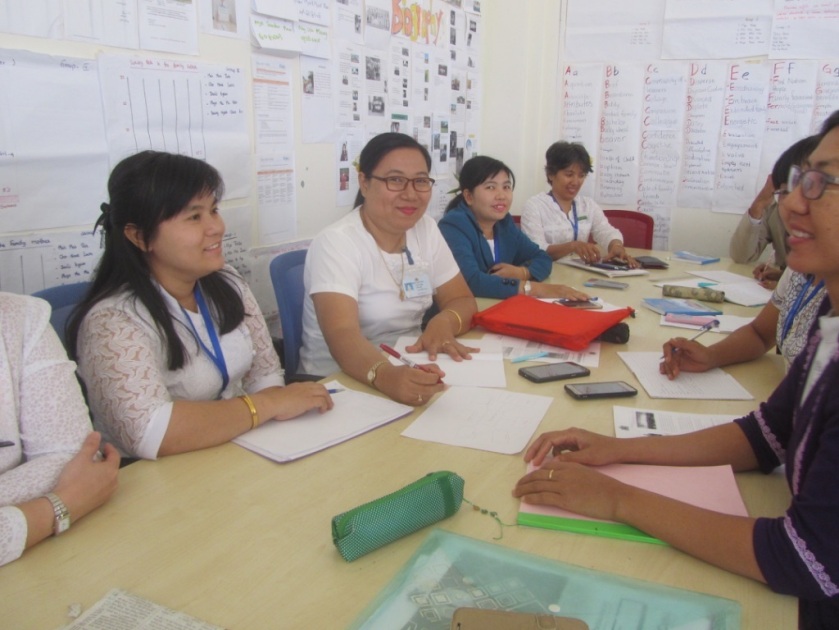… paving the way …
Success!
Today, a year later, my 60 parliamentary students received their certificates, together with a recently published Parliamentary Resource Curriculum that magically arrived at the Hluttaw Union Assembly, Phidaungsu on the morning of the closing ceremony. Like the house of cards, U Bhone Kyi Aung, a high parliamentary official and others like him that were reshuffled somewhere a mile away in the grandeur of the parliament, was leaving for the UK the morning of the closing ceremony, and, still had set aside, his time and energy to honour my students at the ceremony. With his usual grin, his usual firm handshake, he said, ‘I wouldn’t miss the closing ceremony for the world’. The Myanmar people opened their hearts, gave their love, their friendships …
Before the Change …
A year earlier however, it was a rough start!
Monday morning, on my arrival at the Parliament, on my first day at work, I was briefly introduced to the line manager and swiftly ushered away by a parliamentary staff to an empty office, to my desk! Several cleaners soon followed, as per instructed, to move my desk exactly in line with the other 2, where my desk would firmly be placed! What’s more, the same staff proceeded to take the place of my assigned line manager, (who evidently was new in the field) and promptly signed the 3-way agreement without discussing it with him or me? The new line manager appeared to show little interest in the situation or in me? Was he nervous too? Did we get lost in translation along the way?
At the start of my placement there were several glitches that needed to be ironed out. From establishing a classroom for English formal and informal lessons (to on job support); from the number of instructional formal hours I would teach, to discover whom my real boss was, at it appeared that I had many bosses? More to the point, I was intrigued at the lack of respect I was receiving by some people. Parliamentary staffs would ask me how long I had planned to stay at the parliament? Others ignored me and didn’t want to have anything to do with me. There were times that I was included to some events by some, and promptly excluded or disinvited by others. At first, isolated in my office, I wasn’t sure what to make of it all. Everything was new to me. However, I felt it important to make it work through trial and error and to go with the flow. Looking back now, it appeared that I had an ambivalent role as an international employee who did not represent Cuso Myanmar. As a result, they seemed confused and didn’t know how to handle the situation ….
What did we do?
Weeks later, after submitting a proposal for the 1st set of parliamentary students and waiting for approval, U Bhone Kyi Aung the big boss, the new line manager’s boss soon took hold of the reigns to clarify the status quo, and eventually some things began to improve! U Bhone Kyi Aung is forward thinking, highly accommodating, fair-minded and very supportive. He evidently is the backbone of the parliamentary system that supports the English programme and the role I was to play. He wanted success. With each parliamentary class, we had an open ceremony at which time he’d address my students about the significance of the English language, an important skill for them to use proficiently and competently in the workplace. Bhone Kyi Aung took me under his wing and became my mentor, my advocate …. 🙂 Throughout the year at the Hluttaw, we worked closely together to share ideas, to discuss my work, the book (a work in progress) and the next steps. And, in the process we developed a close bond!
With the backing of U Bhone Kyi Aung, I moved office. He gave me a choice of having two offices with 2 desks (one office with air-con and the other without). I chose to move to the Research department, without air-con, where parliamentary staffs and the Line Manager were based. To me it made perfect sense to be in a congenial atmosphere where I was no longer isolated from the Myanmar people. More to the point, I felt it important to play a pivotal role in the workplace where our skills, our culture, language, trust, friendships was aligned with U Bhone Kyi Aung’s belief. Connecting through the hearts, minds of my comrades, meant that I’d also be in a situation where I could observe la vie quotidienne, the everyday ins and outs of my colleagues, the parliamentary staff’s general work function (in our shared office). Working alongside each other, also meant, that through their lenses, a puzzle of intricate pieces at first, that I’d have the opportunity to learn something about the Hluttaw parliamentary system to better help the Myanmar people. I did.
Room 5 …
How did I end up with Room 5? U Bhone Kyi Aung stepped-up to the plate once again
to overrule the case that Room 5 was a better choice (than the small class that I was initially assigned to), to comfortably house 20 students, the instructor, unforeseen guests, such as himself and to welcome other parliamentary officials, staff and/or anyone else at the Hluttaw that either wished to observe or to take part in my class at any time.
Our verbal contract also entailed my formal teaching hours. U Bhone Kyi Aung gave me the choice to teach either 8 hours a week Monday to Thursday or 10 hours per week that included Fridays. I chose the latter. Sensitive, anticipating to the needs of the people, I wanted to have Fridays as catch-up days. I wanted to give personal attention to my students that wanted extra help, conduct informal English discussions, nurture and support them in anything else that would help strengthen their English voices.
As for my afternoons, U Bhone Kyi Aung and I agreed that Room 5 be converted to an informal on-job support venue sessions for small group training with parliamentarians and staff. That is to say, to help MPs and staff alike to effectively carry out their roles in the workplace and anything else that benefited the Myanmar people for a better tomorrow. This included IT, questions and answers addressing enquiries during council meetings, informal English conversational lessons, group discussions with Women MPs that represents, serve, work with marginalized groups in their constituencies, help staff in their department to respond to a proper English email from Burmese translation, to creating a parliamentary job posting (related to staff’s specific job responsibilities), which didn’t appear to exist at the Hluttaw when I first began working with them.
6 weeks later, I met my first set of 20 parliamentary students in Room 5!
What is different today?
Typically, predictably so, as I enter the grandeur of the parliament first thing in the morning, my day begins with a chorus of laughter that echoes throughout the corridors of the ZhaBuThiri Phyidaungsu building that bounces into the parliamentary staff offices. As I reach the shared research staff office at the end of the hall, a bubbly wave of more chatter and laughter resonates all the way to Room 5 with words of contentment that speaks back to me.
Room 5 is a place that Assessment begins from the moment my awe-inspiring, talented students enters my class. As they enter Room 5, I mentally ask myself, ‘Are my English Learners feeling well, excited with full of queries?’ Are they nervous and unsure of the unknown with today’s lessons? Are they enthusiastic, engaged and motivated? Is the class culture shifting from being once a cautious to a more confident and vibrant community of English learners?’ Each day is a different day with full of ‘magical’ possibilities’, with new insights and ideas. Indeed, Room 5 is a room where my students thrive and surprise me with something new each day!
Throughout my teaching at the Hluttaw, there has been a positive change of pace in Room 5, a magical sense of transformation and successes in my students. My students are excited to come to class and over time they have gained more confidence. Shy students that appear to be more self-assured, are now talking, and even volunteer to share our morning introduction to the start of the day’s lesson: either to give a brief account of the daily news, discuss the lyrics of a song, review the day’s work, talk about Myanmar culture, ethnic traditional dress and or fashion, … and anything else that is of interest to them. Once a month, together we typically celebrate our successes in the very grounds of the parliament.
Parliamentarians are also feeling more confident with their Oral English skills and are even laughing at their own mistakes! Conversational English with MPs is a fun and most interesting job one can ever hope to have and whom I have learned much from. These MPs come to the parliament with a wealth of knowledge. Back home in their villages, in their constituencies, they have regular jobs like you and me. They are teachers, farmers, artists, entrepreneurs, doctors, engineers …
During my placement, outside Room 5, I also visited Parliamentary staffs in their designated workplace. This is to address what is it that they want to know and how to strategize ways to strengthen there English skills further in their jobs. Their skills are brought back and addressed in Room 5 for teaching and learning prospects. What’s more, we have also focused on the different creative writing interests, skills that were revealed in my talented students.
The change
Despite the political problems I experienced throughout my placement, despite the last minute bid to deny the closing ceremony for my parliamentary students, despite the rough start, success prevailed! My motto: Keep an open mind, observe, listen, wipe the slate clean, be objective and be receptive to new ideas …
I have been asked several times by a number of people at the Hluttaw, ‘what is your secret in keeping your students? They come to your class everyday.’ I tell them ‘I have an open door policy where my students come and go as they please. Some have early morning commitments and still manage to attend my class. Some, who are unwell, still come to class, because they tell me that they don’t want to miss new ideas or a new ‘exciting’ unit. When I prepare for the next day, my students will pop in to ask if they can help me and or simply hang out… I say, my students are intrigued, curious and hungry to learn’! I answer, ‘I’m flexible, a team player, open to ideas and mindful of my students needs. Therefore, I have a back up plan to change the lesson at the last minute if need be’. I tell them that ‘my students are in a safe environment to freely discuss and express any issues that they want within the walls and safety of Room 5’.
English VOICES of Myanmar
When I began working at the Hluttaw Union Assembly, a parliamentary curriculum did not exist. Part of my job was to create a Parliamentary Resource Curriculum book that made sense to the parliamentarians and parliamentary staff. Consequently, my students were very much involved and included in the process of developing the book. They also got to brainstorm the different types of units that they felt needed to be included in the book. Throughout this yearlong mammoth project, the ‘global village staff’, the parliamentary staff together made ‘lemonade from 2 lemons’. They diligently developed, typed, translated the English text to the Myanmar language and gave everything they had: their souls and their might to help out with every bit of the book from the grassroots up!
‘English VOICES of Myanmar’ was recently published in March 2018. This practical Resource Activity Parliamentary Curriculum has become part of the ‘first’ Cuso collection, encased in the 3-Chamber libraries: Pyidaungsu, Phyithu, Amyotha for anyone to use at the Hluttaw, NayPyiTaw or anywhere else in Myanmar. This also includes all sub-national Hluttaws throughout Myanmar.
What is the book about? The book is about expanding the boundaries of the English language using a higher level of thinking through the use of problem solving, critical thinking, analytical thinking to spark questions for conversation … Some units include ASEAN Citizens, Our country ~ Our Parliament, Education (with a gender education section included), Healthy Living, Family Life in Canada and in Myanmar. This book is also about social inclusion, gender equality, human rights and freedoms.
Since the book was published, the Hluttaw parliamentary leaders printed 35 more copies. And Cuso Country Office Myanmar also printed more copies.
It is worth noting, that the curriculum draft was temporarily put on hold to print. However, the parliamentary leaders overruled the case to continue with the process of completing the final details of the book and to have it published. What’s more, some units became a controversial concept, such as Gender Equality that I was initially asked to remove from the curriculum. Some parliamentary administrators claimed, ‘we have NO issues in Myanmar. Everyone is equal, this includes all ethnic groups in our country’. However, after much discussion, the Gender Equality unit was changed to ‘Gender Roles, which the leaders approved of’. Further, though the ASEAN Citizens Unit remained status quo, Global citizenship Begins With Me however, became ‘Part 2’ of the ASEAN Citizens Unit instead of a unit of its own, because it too, became controversial. As a result, there are 11 units, instead of 12 units.
Befitting with some of our controversial units, Room 5 was a safe environment for freedom of expression. My parliamentary students (MPs and staff) freely discussed and expressed anything that they wanted within the secured walls of Room 5. With trust, together, we talked about ethnic controversial issues and conflicts of their much-loved homeland. Myanmar. This included the Rohingya crisis that they spontaneously had chosen to speak about. Though initially removed from the Myanmar map (at the back of the book), with much discussion however as to whether the word Rohingya should remain on the map or not; In the end, we unanimously decided that it was imperative to put the word ‘Rohingya’ back on the Myanmar map, where it belonged, where the Muslim Rohingya people ‘rightfully’ belong. In Myanmar!
News travel fast! Since the book was published, since the closing ceremony event took place last week, people that we don’t know, boldly come up to us Cuso volunteers, introduce themselves, shake our hands, and with a smile say, ‘You must be Cuso’. ‘We hear good things about you, about the great work that you’re doing here’. ‘Your English book is one of a kind. The first ever to be published in Myanmar!’
Did we just put Cuso on the map?
Alice Chandler, ESL Cuso Volunteer, May 2017 – May 2018
Hluttaw Union Assembly, NayPyiTaw, The Republic of the Union of Myanmar
Volunteers for the world ~ un monde de voluntaire
More later … in the meantime, wishing you fun reading and lots of laughter for May 2018….:)
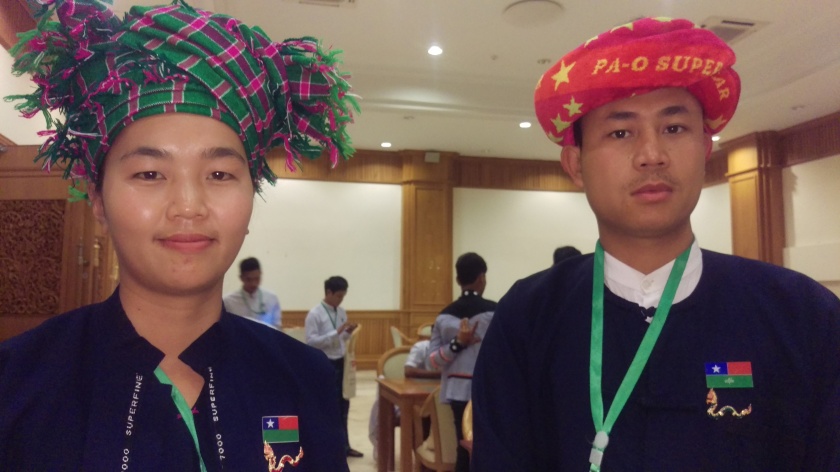
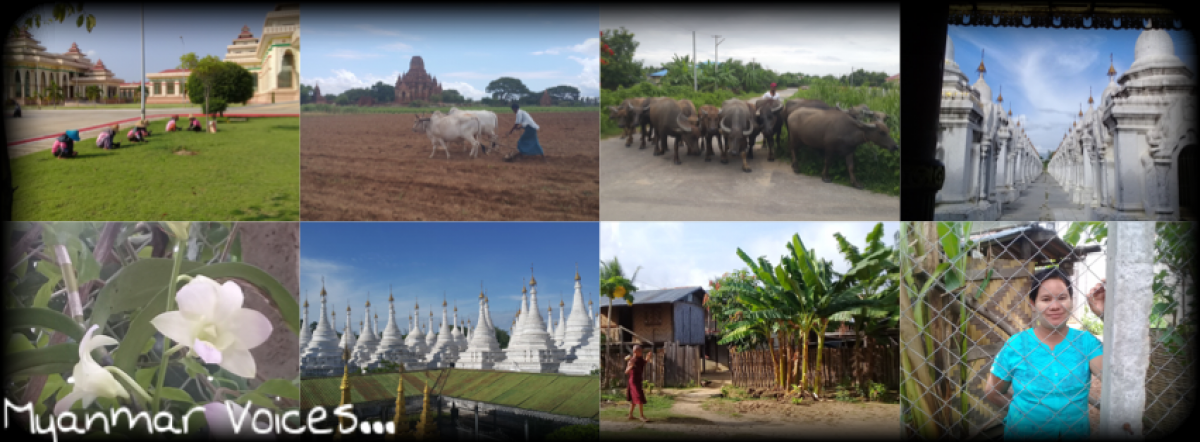
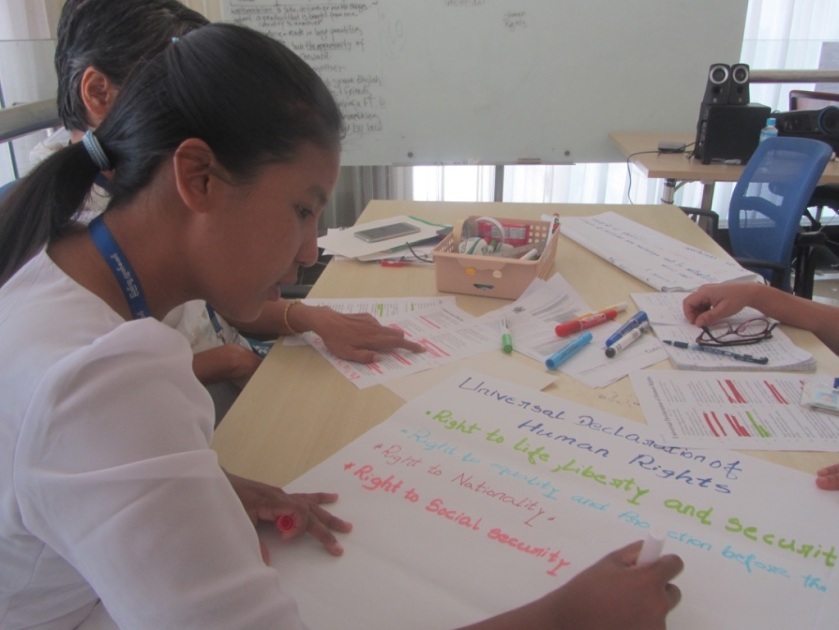 “My name is Phyo Wai Win and I’m from Zigon Township , Bago West Division situated in the lower part of Myanmar bseside Bago-Yoma mountain area”.
“My name is Phyo Wai Win and I’m from Zigon Township , Bago West Division situated in the lower part of Myanmar bseside Bago-Yoma mountain area”.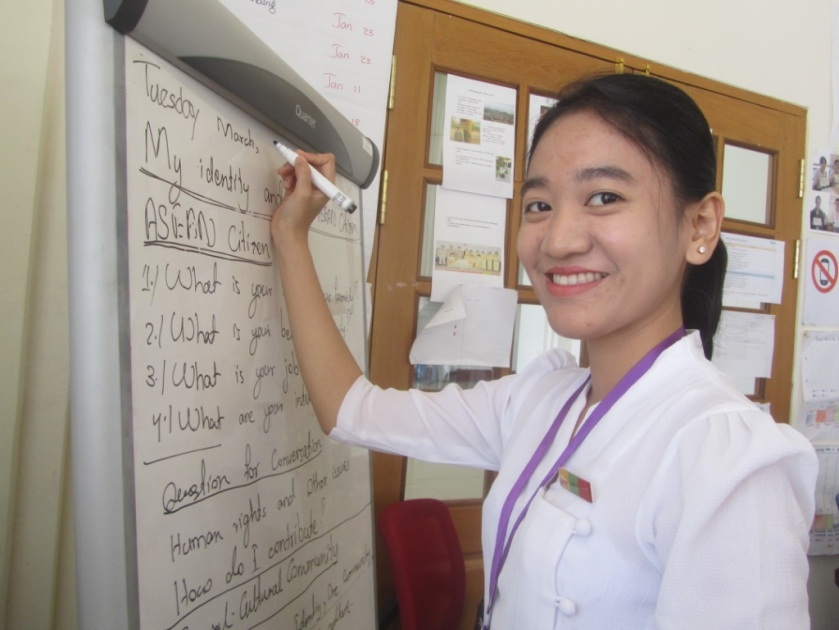 ‘My name is Thida Aung. My hometown is Yangon. I now work at Amyotha Hluttaw Office in Nay Pyi Taw’.
‘My name is Thida Aung. My hometown is Yangon. I now work at Amyotha Hluttaw Office in Nay Pyi Taw’.